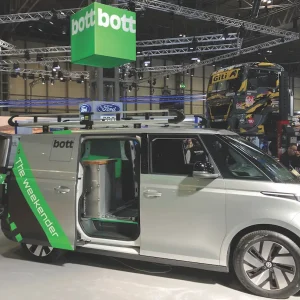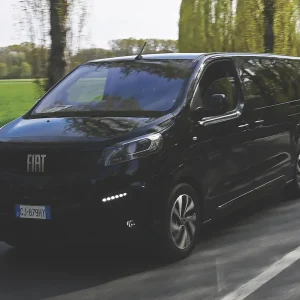Being picky with who they sell to isn’t a luxury enjoyed by many companies bringing a new product to market, especially not a £40,000 light commercial vehicle. But that’s exactly the goal of Azure Dynamics, the company behind the electric version of Ford’s Transit Connect, as it seeks to avoid any damage to the reputation of the technology before it has even got started.
“It’s very important that we don’t sell this vehicle to customers where it is not suitable,” Azure’s sales and marketing director Gary Whittam tells What Van? ”Where they’re going to use, charge and service it is vital and we’re happy to say to customers that the vehicle won’t be suitable. It’s important at the start that you quantify customers; predefined routes in a stop and start environment are best.”
The £39,995 price tag, and first four dealers that will be selling the vehicle were announced at the Commercial Vehicle Show in Birmingham in April. Bristol, Warrington and two London locations are the initial points of contact, with 30 UK Ford dealers able to service the vehicles. More will be added as the volumes increase. “As the market grows we will grow the network but we want to do it organically so we haven’t got dealers investing with no return or not seeing the benefit.“
Whittam says the early customers have agreed to have their vehicles data–logged, in order to help better understand the usage patterns of electric models. “This industry is full of myth and legend, and we have an obligation as an industry to tell the truth and tell customers where the holes are,” he says. “The volume of customers have a prescribed route in city centres – we want to make sure the vehicles go to the right customers and do the right things. It would be easy to spread the net wider and find a percentage of unsuitable customers with a vehicle that won’t do what they want.”
The main competition from other vehicle manufacturers at this stage will come from Renault’s Kangoo EV, with first deliveries due in September or October. Priced from £16,990 excluding VAT, plus a £59 per month battery lease, Renault is taking the alternative route to Azure, in not including the battery in the list price, and of pricing its electric van considerably cheaper than the Connect. “Clearly their strategy is their strategy,” says Whittam. “But it’s in nobody’s best interest to sell these vehicles at a loss.“
Though buying outright is an option, Whittam feels that a lease purchase will probably be the most popular option. “Leasing will be an opportunity because people don’t want capital expenditure, but it will take three years to establish RVs, because the industry doesn’t like change,” he says. “I’m saying to customers that I don’t know what the RVs will be but give yourself flexibility so if there is a market you can dispose if it when you want and for the money you want.” He also predicts the used market will be slow to take off, with early adopters of the new models likely to hold onto them for at least five years.
He predicts that the Connect EV will break even against a diesel Transit Connect around the end of the third year at 20,000 miles per year, at current fuel and energy prices, while servicing is quicker and cheaper thanks to the absence of moving parts that make up an internal combustion engine.
Already sold out until quarter three this year, Whittam reckons Azure will shift between 300-500 units this year, and at least 1000 in a full year, as part of the 3000 expected to find homes across Europe in 2012. In time he feels electric vans could make up 30% of UK delivery vehicles, with health service, housing association, police forensic units and power companies all on the prospective customer list.





